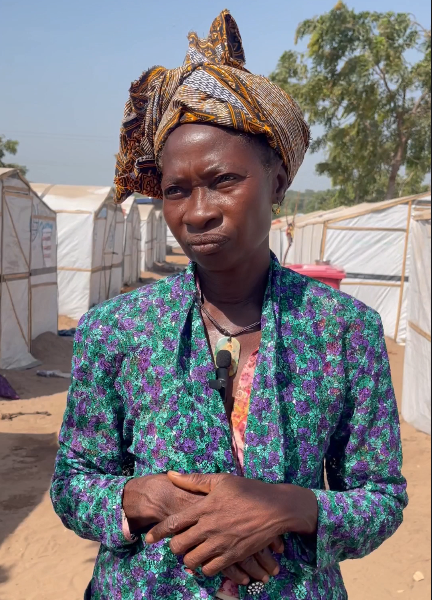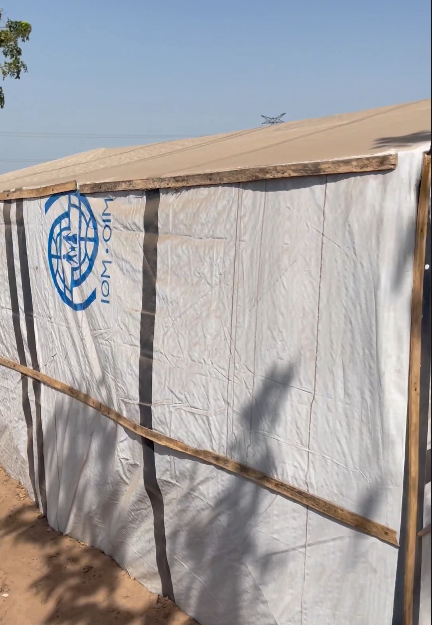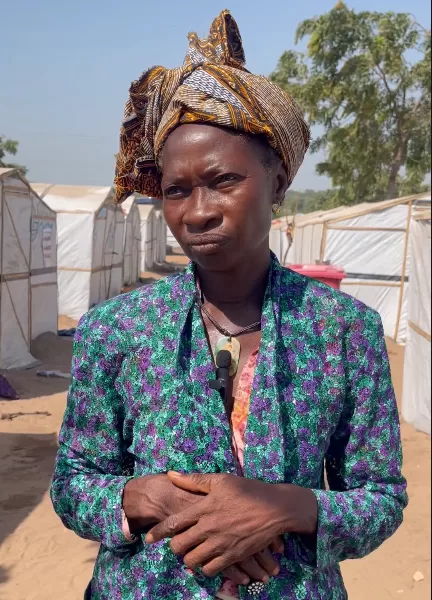The festive cheer of Yuletide and the 2014 new year had barely faded when tragedy struck Ipav in Guma Local Government Area (LGA) of Benue State in Nigeria’s North-central. Families were still exchanging home-cooked meals, and children’s laughter echoed through the streets when gunshots erupted that evening, tearing through the peace.
“They were shooting at us. Some died, and some of us fled,” Patricia Nyikor, an Ipav local, recounted.
Since that day, Patricia and her relatives have been trapped in a relentless cycle of displacement, moving from one internally displaced persons (IDP) camp to another in Makurdi, the Benue State capital.
She is one of the over 500,000 ‘registered’ displaced persons in Benue State, according to a June 2024 report by the UN’s International Organisation for Migration (IOM). The protracted farmer-herder conflict has forced families like hers into about 41 camps and host communities across six local government areas. Guma, Patricia’s home, bears the brunt of the crisis, hosting 60,445 displaced individuals across 17,636 households.
Until a few months ago, Patricia and her family lived at Baka Camp in Makurdi. They were recently relocated to the newly inaugurated Mega IDP Camp in Gbajimba, Guma LGA. This relocation is part of a state government initiative to consolidate thousands of displaced people from three camps within the state capital — NEPA Quarters, Ichwa, and Baka — into the Mega Camp, which is expected to house over 3,000 tents when fully completed. Authorities have promised facilities like a hospital, a school, and a worship centre to serve the residents.
But for many, including Patricia, these promises bring little relief.
“Life was good before the attack,” she said, her gaze unfocused. “We ate well, sent our kids to school, and could afford hospital care with the income from our farm. But now, everything is a struggle.”

Survival in the camps hinges on hard labour, with Patricia and others relying on nearby farms to scrape by. “When we arrived here [the Mega Camp], we didn’t receive any aid, especially food, for more than two weeks,” she said. “So, we had to work for farmers, helping with rice harvests, just to have something to eat.”
The rewards for their efforts are meagre—sometimes as little as ₦2,000 ($1.18). On other days, they are paid in kind, receiving farm produce like tubers of yam or rice as compensation.
“Our biggest challenge here is hunger, especially with the economic situation,” Igbakula Tachia, another resident at the Mega IDP Camp, told HumAngle. “We haven’t seen much intervention yet, so we rely on menial jobs, mostly on farms. Sometimes, the children are forced to go out and beg.”
Aside from working on farms and taking on other menial jobs, some displaced persons find alternative ways to survive, according to Michelle Ngutsav, a humanitarian worker with Hand of Favor Global Care and Support Foundation who supports IDP camps in Benue.
“Some of them go into nearby bushes to gather firewood to sell, while others use donated items [or money] to start small businesses,” she said. “You’ll often see women selling vegetables, peppers, and tomatoes by the roadside.”
Patricia is one of these women. Besides her farm work, she runs a small-scale business selling garri and groundnuts at the camp to fend for her children.
‘No place like home’
The dry, dusty winds of Harmattan have turned the camp’s environment into an even harsher place. As the season deepens, the evening cold grows more intense, adding another layer of discomfort to their already difficult lives. The surrounding trees only seem to amplify the chill.
More than a decade since her displacement, most of the wrappers Patricia fled with have either torn or been lost through successive camp relocations. “We try our best to keep warm at night,” she said. “This new camp is better than where we were before. There, we made tents out of mosquito nets, but these are made from trampoline, and we have beds,” she added, pointing to the IOM-marked tents that now shelter them.
However, the reality is far harsher for IDPs living in less secure shelters, such as those at Tse Yandev and Ichwa, where tents are often fashioned from mosquito nets and sacks. These improvised homes provide little protection from the elements. During the rains, water seeps in or even collapses the fragile structures, while the cold at night during the harmattan season grips them as they sleep on the bare ground, with only rags and nets to shield them.
“If people living in well-built houses with duvets still struggle with the cold, you can imagine what it’s like for those in these camps,” Michelle added.

“No matter what, there is no place like home,” Patricia whispered.
Unlike Borno State in northeastern Nigeria, where local authorities have begun the resettlement of IDPs displaced by the Boko Haram insurgency, Benue is yet to initiate such efforts. However, James Iorpuu, the acting Executive Secretary of the State Emergency Management Agency, has assured that plans for resettlement are in progress.
“These are temporary tents. We do not intend to accommodate you here for a long time,” James said. “The Benue government has made it very clear that it [will] resettle all IDPs in their ancestral homes.”
In Benue State, Nigeria, over 500,000 people have been displaced due to ongoing farmer-herder conflicts, with many seeking refuge in internally displaced persons (IDP) camps. Recently, some residents, including Patricia Nyikor, were relocated to the newly inaugurated Mega IDP Camp in Guma LGA, which is yet to fulfill its promises of essential facilities like schools and hospitals.
Life in these camps involves struggling for basic needs, as residents rely on hard labor, often working on nearby farms for meager wages.
Despite efforts by some to start small businesses, the harsh living conditions are exacerbated by the weather, with many makeshift shelters offering little protection.
Unlike other regions that have initiated resettlement plans for IDPs, Benue State is yet to start such programs, although plans are reportedly underway.
The government aims to eventually return all displaced individuals to their ancestral homes, but the timeline and effectiveness of these efforts remain uncertain.
